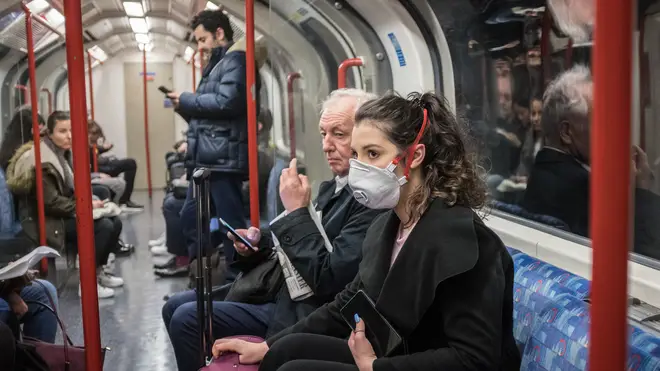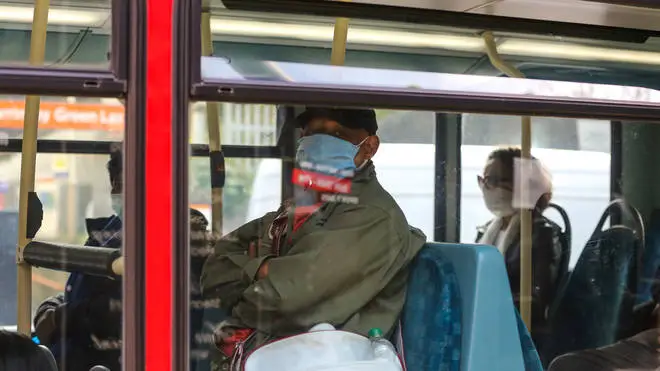
Ian Payne 4am - 7am
5 June 2020, 00:45

Face masks and coverings are set to become compulsory when using public transport in England, but what will the new rules mean for you and when will they be enforced?
Transport Secretary Grant Shapps made the announcement while speaking at the government's daily coronavirus press briefing on Thursday.

Nick Ferrari asks Transport Secretary why facemasks are introduced now
The government has said that while wearing a face covering does not necessarily protect the wearer, it could protect others from an infected wearer who has not yet developed symptoms.
So how will the news measures affect your journey?
Read more: Wearing face masks in the house 'could curb coronavirus spread'
Read more: Sadiq Khan could make face masks 'mandatory' on Tube and buses in London

Face coverings to be made mandatory on public transport in England
Face coverings and masks must be worn on buses, trains, tubes, trams, and ferries from Monday 15 June onwards.
Therefore, for the rest of this week it is not mandatory to wear them, however the government is currently recommending that you do.
Public transport staff will also be required to wear face coverings.
However, LBC's Westminster Correspondent Ben Kentish spoke with No 10 on Wednesday evening and was told this rule would not apply to taxis.
Mr Shapps suggested passengers travelling on trains starting outside England may have to put on coverings when crossing the border, but it will be up to Scotland and Wales to issue their own guidance.

Although face masks will be compulsory if you travel by public transport, rail and bus workers will not be expected to enforce the measure.
However, transport operators and the British Transport Police can step in "if necessary".
But, speaking at the press briefing, Mr Shapps and Sir Peter Gerard Hendy, the chairman of Network Rail, said they expected the public to follow the rule because "it's in everybody's interests to make this work."
The minister added that changes would be made to the conditions of travel for trains and buses, saying: "This will mean that you can be refused travel if you don't comply and you could be fined."

Make your own Face mask in 10 minutes!
Although most people will be expected to wear face coverings when using public transport, some people will, understandably, need to be excluded.
Very young children will not be forced to wear them, along with people with disabilities or those with breathing difficulties.
However, public transport staff will not be exempt from the new rule.

Nicola Sturgeon recommends face coverings in shops and on public transport
Face masks and coverings should be worn in enclosed spaces, including shops, but they are not being recommended for when you are outdoors, in schools or in offices.
A number of airlines, such as EasyJet and Ryanair, have begun making face masks mandatory for passengers.
Medical face masks should be reserved for those who need them most or who are most at risk in their workplaces, such as health and care workers.
Scarves, cotton home-made coverings that cover the nose and mouth, and other bought masks that are not ones used by the frontline workers are fine.
Officials said that people can make coverings at home, but added that "the key thing is it should cover your mouth and nose."
However, if you develop Covid-19 symptoms, the government's advice has not changed, therefore you and your household must self-isolate at home.
You should remain vigilant and adhere to other preventative measures such as social distancing and hand hygiene even if wearing a face covering.